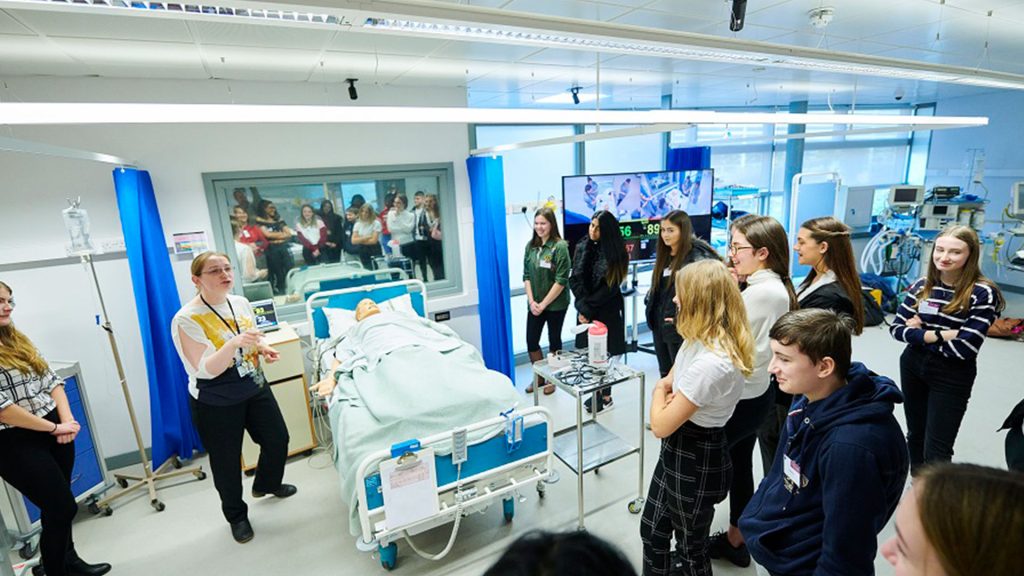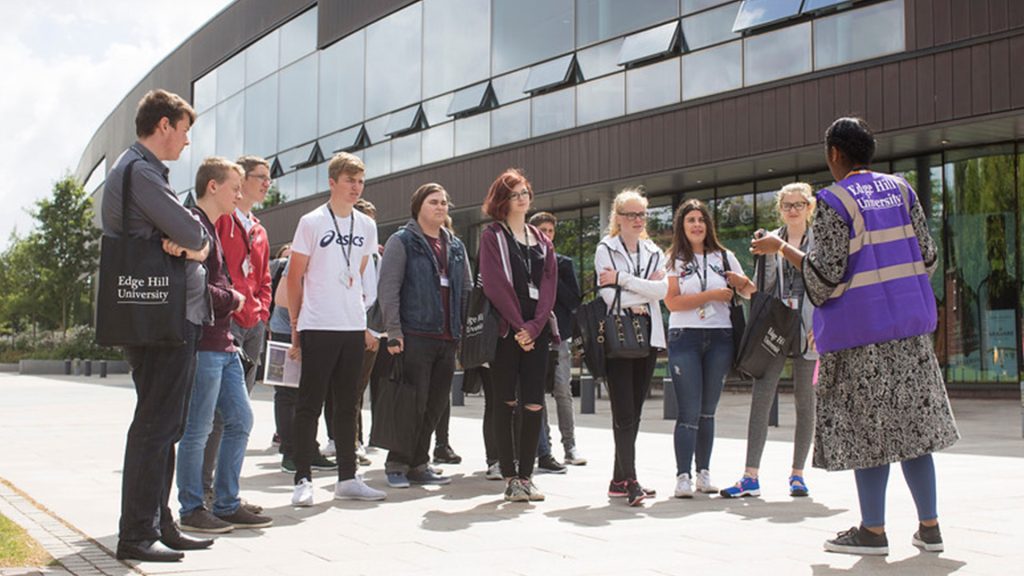Post 16 activities – on campus activities
Find out more about how we are able to welcome groups of students onto our campus through a variety of opportunities and activities. Make sure you also check out our off-campus events provision.
Booking a subject taster day
We are excited to be able to invite you onto campus to take part in our subject taster days. These events give students the opportunity to:
- attend introduction and taster sessions in their chosen subject
- explore how school and university subjects relate to different career paths
- find out about the facilities, accommodation and campus Edge Hill University has to offer
- receive general higher education information
- speak to current students and staff
- ask any questions they may have.

The clear link with careers means our subject taster days can make a useful contribution to a school or college’s gatsby benchmarks. These events provide opportunities for deeper engagement with the subject, enhancing A Level or BTEC study and enabling students to make an informed choice about higher education.
Autumn 2023
| Event title | Date | Schools and colleges booking | Individual booking |
|---|---|---|---|
| Psychology | Wednesday 11 October | Fully booked | Fully booked |
| Computing Science (Computing & Engineering) | Wednesday 18 October | Fully booked | Fully booked |
| Engineering (Computing & Engineering) | Wednesday 18 October | Book now | Book now |
| Business | Wednesday 18 October | Fully booked | Fully booked |
| Biosciences | Friday 20 October | Fully booked | Fully booked |
| English & Creative Writing (Creative Arts) | Wednesday 8 November | Fully booked | Fully booked |
| Film, Media, TV, Animation & Music Production (Creative Arts) | Wednesday 8 November | Fully booked | Fully booked |
| Dance, Drama & Musical Theatre (Creative Arts) | Wednesday 8 November | Fully booked | Fully booked |
| Education & Teaching | Friday 10 November | Fully booked | Fully booked |
| Health & Social Care | Wednesday 15 November | Fully booked | Fully booked |
| Law, Criminology, Policing & Politics | Friday 17 November | Fully booked | Fully booked |
| Sport & Physical Activity | Wednesday 22 November | Fully booked | Fully booked |
| History, Geosciences & Social Sciences | Wednesday 29 November | Book now | Book now |
Student feedback
“The taster day helped me to make a decision on what to study and also boosted my confidence”
Student on Health and Social Care taster day
“The students enjoyed the day, they got an insight into the university and they really liked the student ambassador who was really helpful and informative about the campus and everything course related.”
Runshaw College
For subject specific campus visits, we would direct schools/colleges to book onto our subject taster days, via the subject taster day tab above.
The team have extensive experience organising and facilitating bespoke school and college campus visits, ranging from small cohorts of students to entire year groups.
“A massive thank you to all involved. It was a very worthwhile trip and we very much appreciate the effort that was put into the planning of it. It is definitely something that I would look to repeat with future year groups”
Head of Sixth Form
Programmes can be tailored around individual school or college requirements in terms of sessions and timings but a typical example of a programme for the day can be seen below:

| Time | Activity |
|---|---|
| 9.45am | Arrival and welcome |
| 10am | Introduction to higher education: Choosing a course and University |
| 11am | Workshop of your choice (from our range of presentations/workshop activities) |
| 12pm | Lunch (provided by the university) |
| 12.45pm | Campus Tour (led by student guides) |
| 1.45pm | Evaluation Student Guide Q and A Student Life Talk (optional) |
| 2.30pm | Departure |
Booking a bespoke campus visit
To discuss a visit, please contact the Education Liaison Officer responsible for your region, or email [email protected].
The team can offer discounted or free tickets to a range of our arts centre performances and shows. Before any performance, we are able to include a campus tour, workshop of your choice from our menu of activity and/or refreshments.
See what’s on at the Arts Centre on their website.
To discuss this further, please contact the Education Liaison Officer responsible for your region, or email [email protected].
We hold open days and campus tours throughout the year.
Book your place online